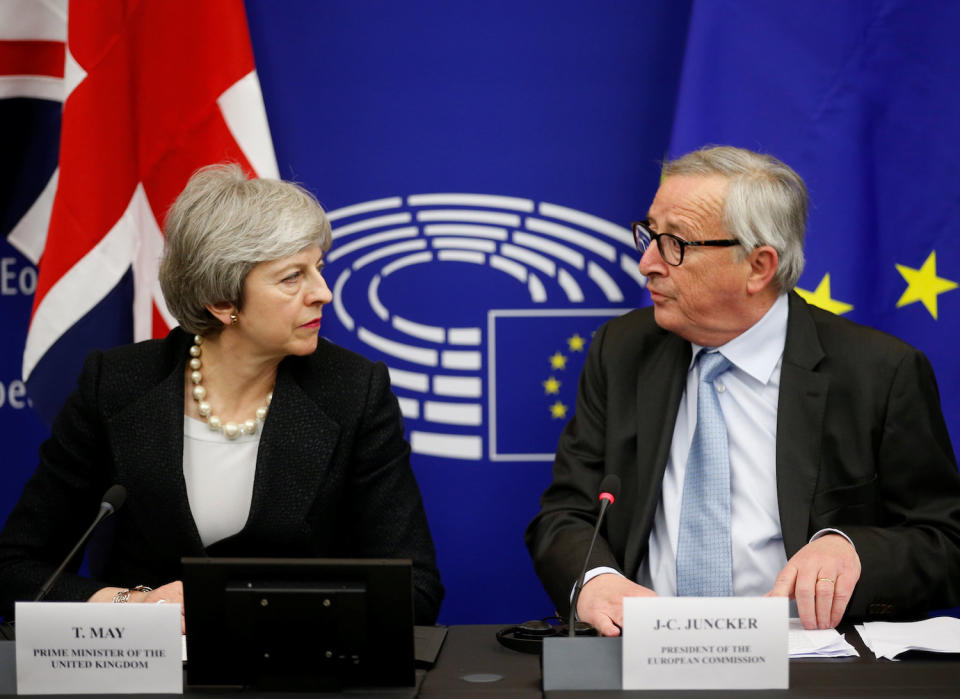Here’s why a Brexit extension will still be painful for the UK economy

British members of parliament voted on Thursday to extend the Brexit deadline, which is widely considered a preferable alternative to a messy, no-deal Brexit on 29 March.
But an extension – which still has to be approved by the European Union – shouldn’t be celebrated. It’s still expected to cause pain for the UK economy by holding back growth, delaying business investment, hurting household spending, and creating disruptive currency fluctuations.
An extension also raises the prospect of a snap general election, which would create further economic and market uncertainty in the weeks and months ahead.
A Brexit extension is similar to a “stay of execution,” according to Stephanie Kelly, a senior political economist at Aberdeen Standard Investments Research Institute.
“It’s a good thing. But it’s not the solution,” Kelly said in an interview with Yahoo Finance UK ahead of the parliamentary vote. “We still haven’t found the solution.”
The British Chamber of Commerce, which represents thousands of businesses across the country, called the potential extension “a necessity, but it’s no silver bullet for businesses.”
“A deadline that is continuously pushed back isn’t a deadline, it’s an invitation to cancel investment, stop hiring, or move UK operations somewhere else,” the organisation said in a written statement.
The Institute of Directors echoed this sentiment, telling Yahoo Finance UK, “A recurring extension without clear purpose could simply extend the uncertainty, continuing the trend of investment being put on hold.”
The UK auto manufacturing sector stands as the starkest example of what Brexit uncertainty has meant for British industries, with the Society of Motor Manufacturers and Traders (SMMT) noting that fresh inward investment in the British car sector plummeted by nearly 50% last year “amid fears over the UK’s future trading prospects with the EU and other key global markets after [Brexit].”
In the past few months alone, UK-based car manufacturers announced roughly 14,000 job cuts as companies detailed plans to move production elsewhere. Experts pointed to the uncertainty surrounding Brexit as a key issue behind these moves.
“It all comes back to Brexit uncertainty,” said Ruth Gregory, a senior UK economist at Capital Economics. “There’s still no resolution in sight. The longer that Brexit uncertainty lasts, the longer it could weigh on the economy.”
Economic downgrades
Economists had been slashing their overall forecasts for British growth this year as a Brexit extension looked increasingly likely.
KPMG recently predicted that the British economy would expand by just 1.2% this year, down from a previous forecast of 1.6%, as a result of longer-than-expected Brexit uncertainty.
KPMG’s chief economist and Brexit expert Yael Selfin said the downgraded forecast was based on expectations for a delayed Brexit, which would lead to delayed business investment and household spending.
Even if a Brexit deal is reached, things won’t go back to normal.
“We’re not expecting all the investment to pick up immediately. You have a lag,” Selfin told Yahoo Finance UK.
The Corbyn wildcard
A potential Brexit extension that pushes the deadline back until at least the end of June of this year also raises the prospect of a snap general election, which creates new business and economic risks, according to Kelly from Aberdeen Standard Investments.
Labour leader Jeremy Corbyn and his radical economic policies are considered to be a massive threat by many in the business and investment community. Some argue privately that Corbyn as prime minister could be a greater risk to their businesses than Brexit.
Corbyn has promoted plans to redistribute up to 10% of company equity to workers and nationalise a range of companies, including private rail firms and Royal Mail (RMG.L).
The threat of Labour’s “business unfriendly policies” are considered to outweigh any positives related to the political party’s softer Brexit approach, Kelly said.
The Confederation of British Industry (CBI) warned last year that Corbyn’s policies would “crack the foundations of this country’s prosperity.”
“From renationalisation to dilution of shares, Labour seems determined to impose rules that display a wilful misunderstanding of business,” the CBI said in September 2018.
Still, a new survey released on Thursday by the CBI shows nearly nine out of 10 firms would prefer to delay Brexit rather than crash out of the EU without a deal.
Some 88% said they favoured an extension if the alternative was a no-deal Brexit.
“An overwhelming majority of businesses want an extension to Article 50, which should be as short as possible, but as long as is necessary,” CBI deputy director-general Josh Hardie said.

 Yahoo Finance
Yahoo Finance 